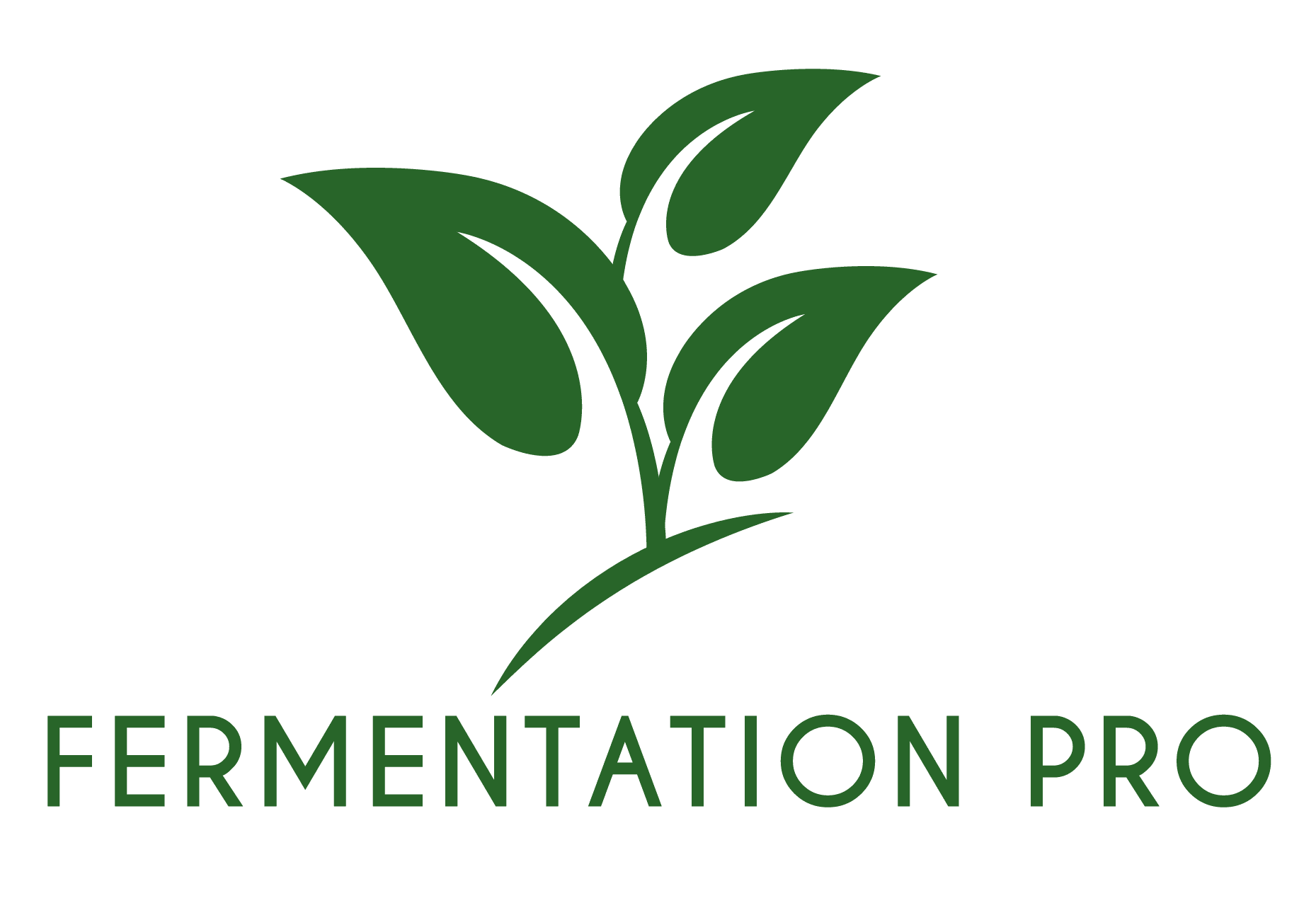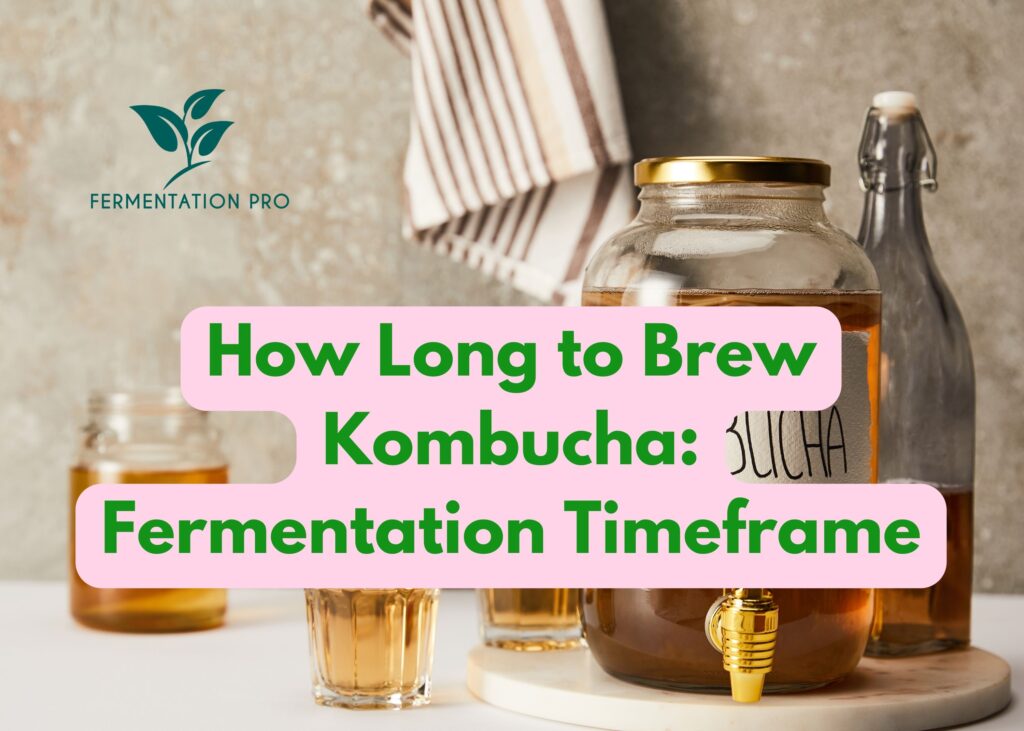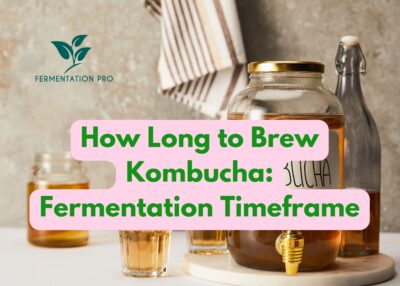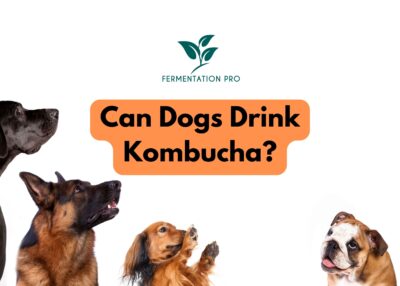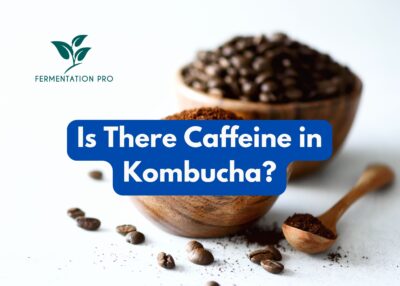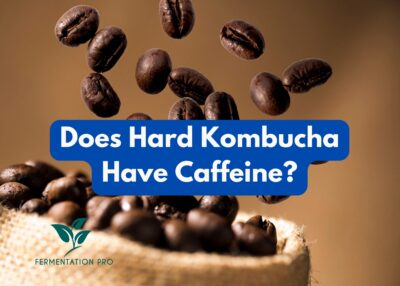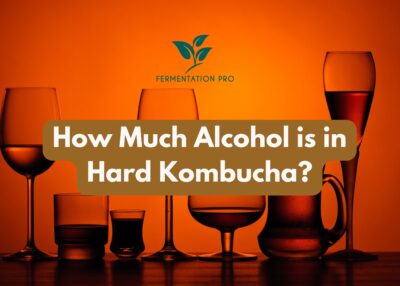At this moment, you are probably thinking about starting your Kombucha ferment or already brewing Kombucha on your kitchen counter. While it is easy to start fermenting Kombucha, determining how long you should brew it can be confusing.
Kombucha undergoes two fermentation processes namely first fermentation (F1) and second fermentation(F2). F1 typically takes 7 to 10 days while F2 can take 3 to 14 days. Do note that these timeframes may not apply to every Kombucha ferment. Kombucha’s fermentation time can vary depending on several factors like preferred taste, temperature, sugar, and SCOBY’s health and age. In addition, if you are only using a starter tea and still need to make your own SCOBY, the fermentation time will take one to four weeks more.
To help you understand the fermentation process of Kombucha easier, you may check the Kombucha timeframe below.
Table of Contents
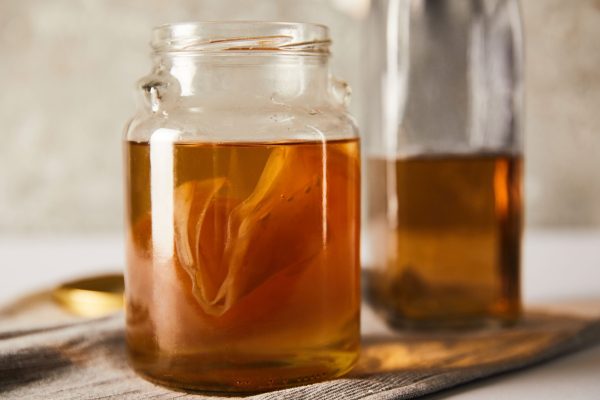
Kombucha Timeframe
First Fermentation
The first fermentation of Kombucha is for making the Kombucha. During this time, the Kombucha is stored in a brewing vessel and secured with a breathable cover to allow oxygen to pass through.
First Fermentation Timeframe
Day 1 to 7 | During the first seven days of Kombucha fermentation, the culture of bacteria and yeast in Kombucha converts the sweet tea to Kombucha. |
Day 7 to 8 | On the seventh to the eighth day of the first fermentation, the Kombucha should not taste like tea anymore. It should have a sweet and sour vinegary taste. It should also be ready for consumption. If you are not a fan of flat Kombucha, you may bottle your day 7 to 8 Kombucha and allow it to undergo second fermentation for carbonation and flavoring. |
Day 8+ | The Kombucha continues to taste less sweet. It will also develop more acidity. |
After the sixth day, you may regularly taste your Kombucha to keep track of the flavor development and prevent it from over-fermenting. When the Kombucha achieves your preferred balance of sweet and tart, you can start drinking it or proceed to the second fermentation for flavoring and carbonation. The taste of Kombucha that has finished its first fermentation is tart just like apple cider vinegar and has a subtle sweetness. .
Second Fermentation
The second fermentation of Kombucha is done for flavoring and carbonating Kombucha. During this second fermentation, the F1 Kombucha is transferred to glass bottles. Next, brewers add their preferred flavorings to each bottle. Then, the bottles are sealed tightly to prevent carbon dioxide from escaping. Finally, the bottled Kombuchas undergo fermentation.
Second Fermentation Timeframe
Day 1 to 2 | The yeast starts to break down sugar from the flavorings used and produces carbon dioxide. The carbon dioxide produced by the yeast is not able to escape the sealed bottle and dissolves in the Kombucha liquid giving the drink its effervescence. |
Day 3 to 4 | On days 3 to 4, the bottled Kombucha should be ready for consumption. However, its taste is usually mild. Depending on the flavorings used, the Kombucha can have mild, sweet, or herby savor. It should also have little carbonation. |
Day 5+ | The bottled Kombucha develops a stronger tart taste and more carbonation. It also becomes less sweet as the yeast has already fed on most of the sugar content. During this time, you may need to burp the Kombucha to prevent the Kombucha bombs. |
You may start tasting your bottled Kombucha on the third day to prevent it from getting too tart for your taste. If the bottled Kombucha reaches your preferred taste, transfer it and the rest of your bottled Kombucha to the fridge. The cold temperature in the fridge can slow down fermentation and preserve your preferred taste.
How Long Should You Let Kombucha Ferment?
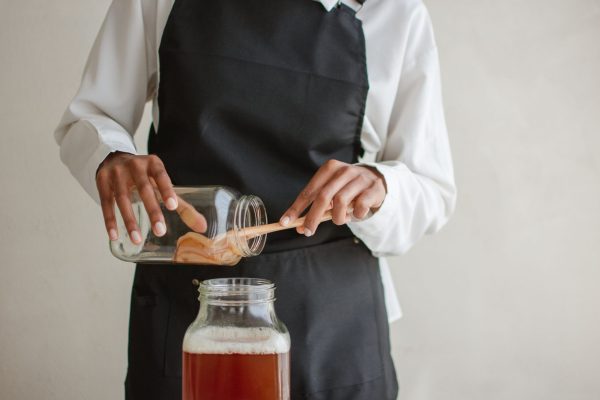
The truth is it all depends on several factors which are:
- Your preferred taste
- Brewing temperature
- Sugar
- SCOBY’s age and health
Below we discuss how these factors can affect how long you should let Kombucha ferment.
Your Preferred Taste
Kombucha’s taste changes as the fermentation continue. Essentially, the longer you ferment Kombucha, the stronger it will taste. Hence, you should taste your Kombucha regularly to make sure that it doesn’t become too tart for your liking.
Brewing Temperature
Kombucha can be fermented at temperatures between 60℉ to 85℉. However, Kombucha brewed on the warmer end of this temperature range tends to develop the most delectable balance of sweetness and tartness for most Kombucha drinkers.
Besides taste, temperature also affects the time of fermentation. Kombucha brewed at warmer temperatures can ferment faster. Conversely, Kombucha brewed at a cold temperature can take longer to complete fermentation.
Whether you are brewing at cold or warm brewing temperatures, we suggest keeping track of your Kombucha’s temperature as sudden temperature changes can disturb the activity of the Kombucha culture and affect the fermentation time. A sudden drop in the temperature can cause the culture of bacteria and yeast to slow down. This leads to longer fermentation time and a milder taste. On the other hand, if the temperature suddenly becomes warmer, the yeast and bacteria may become weaker and start to die. If the yeast and bacteria die, the Kombucha will not continue to ferment and will be vulnerable to molds.
Sugar
Sugar serves as the food for the culture of bacteria and yeast in Kombucha. Fundamentally, the more sugar they eat the more active they become and the faster they can ferment the Kombucha.
The rule of thumb when adding sugar to Kombucha is to use 1 cup per 1 gallon. However, some may add more sugar especially when they are brewing at cold temperatures. This encourages yeast activity and increases the rate of fermentation.
SCOBY’s age and health
The SCOBY or Symbiotic Culture of Bacteria and Yeast is a culinary cellulose mat that consists of lactic acid bacteria, acetic acid bacteria, and yeast. Its primary purpose is to kickstart the fermentation process. It is also responsible for protecting the Kombucha against contaminants that can cause damage to the brew. With a healthy SCOBY, the Kombucha brew can develop acidity at the right pace. The acidity provides a layer of protection against contamination and the growth of molds.
When the SCOBY is old and weak, the fermentation will take longer, and you will have to extend the fermentation time of your Kombucha. In addition, the Kombucha ferment may take longer to acidify and become vulnerable to molds.
Just a reminder, if your Kombucha develops molds, do not try to salvage it and just discard the entire batch. Molds contain mycotoxins that can be dangerous to health if consumed by an individual.
Can Kombucha Ferment in 3 Days?
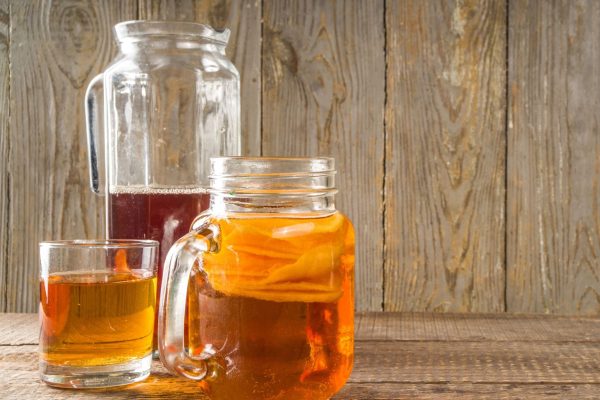
Kombucha can ferment in 3 days if you are using the continuous brewing method. Continuous brew Kombucha makes Kombucha indefinitely, which makes it rich with fully mature cultures of bacteria and yeast capable of fermenting Kombucha in just 2 to 3 days.
Continuous brew Kombucha is a brewing technique that allows Kombucha to brew indefinitely. It is done in relatively large vessels with a spigot. When your Kombucha is ready, you can just draw off the finished Kombucha from the vessel’s spigot rather than all at once. If you are running low on Kombucha, you can simply add more sweet tea and allow it to ferment for 3 days and more depending on your preferred taste.
When it comes to batch-brewed Kombucha, three days can be very short to convert the sweet tea to Kombucha. The earliest possible time for Kombucha to finish its first fermentation is 6 to 7 days. However, do not be discouraged because of the longer fermentation time. Oftentimes, a longer fermentation time results in a Kombucha drink with more complex flavors.
During the second fermentation, bottled Kombucha is typically ready after 3 days. At this moment, it should have carbonation and will acquire a unique flavor profile depending on the flavorings used.
How Long Does It Take to Boil Kombucha?
You can boil tea and water for the Kombucha sweet tea for 5 to 10 minutes. Essentially, the hotter the water and the longer the steeping, the more beneficial plant compounds the water can extract. However, do not oversteep the tea as it can become very bitter and give Kombucha a strong flavor and unpleasant bitter notes.
Tea gives Kombucha amazing health benefits including its antioxidants that protect cells and tissues from damage due to free radicals. In addition, tea also gives Kombucha its rich color.
Can Kombucha Ferment Too Long?
As long as there is no mold, you can feel free to let your Kombucha ferment. However, fermenting Kombucha for too long causes it to over-ferment and acquire a strong acidic taste that is not palatable for regular consumption.
Overfermented Kombucha, also called Kombucha vinegar, is the product of fermenting Kombucha for too long. Due to its strong taste, Kombucha vinegar is not consumed as much as regular Kombucha. Nevertheless, Kombucha vinegar can still be very useful. Kombucha vinegar can be used as a cleaner, food ingredient, skincare product, and more.
Can You Drink Kombucha After First Ferment?
Yes, you can drink Kombucha that has only finished the first fermentation. However, it will not have effervescence. F1 Kombucha is a non-fizzy drink that has a strong acidic taste and a subtle sweetness.
Once your F1 Kombucha reaches your preferred balance of sweet and tart, you can transfer your batch to containers and store them in the fridge to slow down fermentation and preserve its taste. Keeping Kombucha in your fermentation station after it achieves your preferred taste will allow your Kombucha to continue fermentation. When the fermentation goes on, the taste of Kombucha also becomes stronger.
